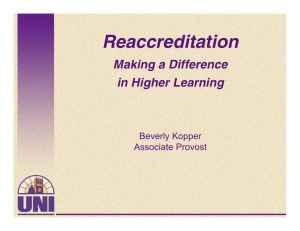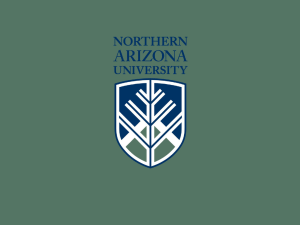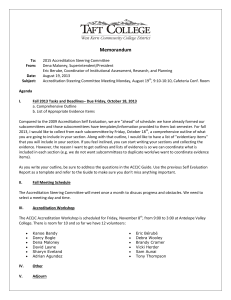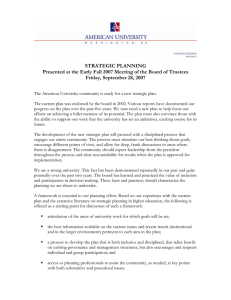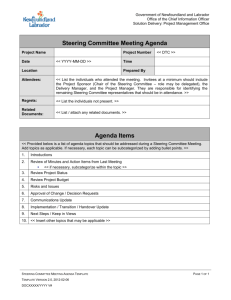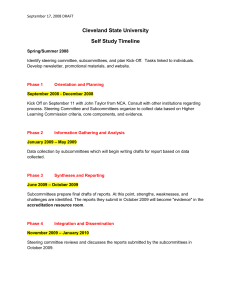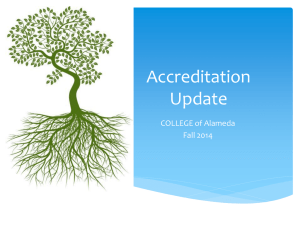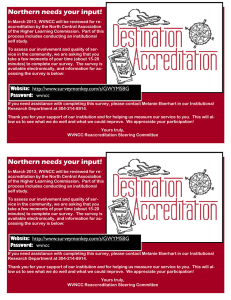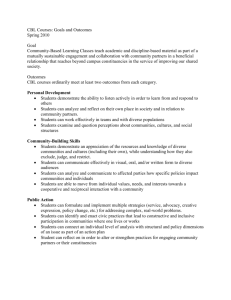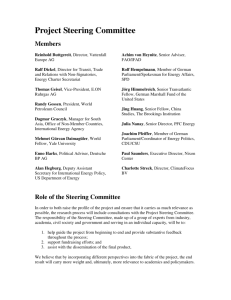Document 10787806
advertisement
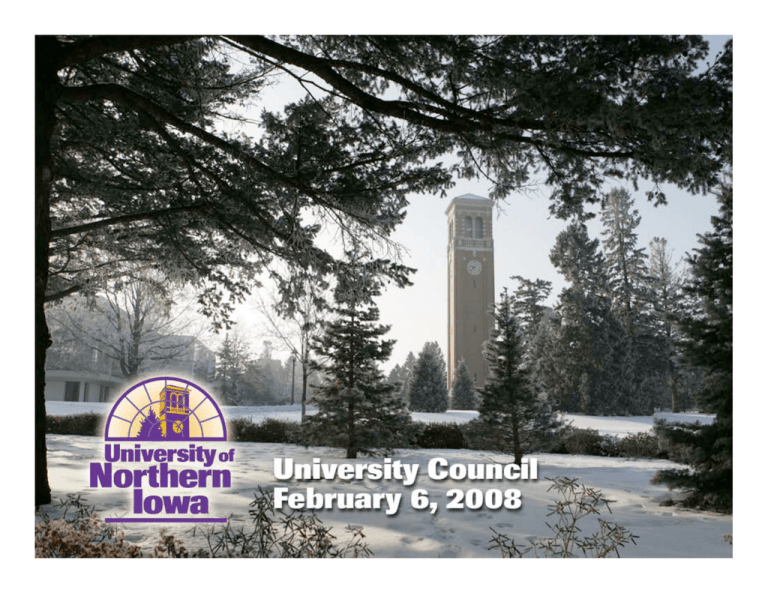
President’s Welcome Reaccreditation Making a Difference in Higher Learning Beverly Kopper Associate Provost Focus of Accreditation • Assess the quality of an institution and its effectiveness • Assist the institution in making improvements in its operations and effectiveness • Provide mission-driven accreditation History • Last site visit – 2001 • NCA Progress Report - October 1, 2004 • Report on the uneven implementation of the University’s Assessment Plan in the General Education program: • structure and role of the oversight body • assessment of its integrated curriculum through student learning Timelines Spring, 2008 • Self-study steering committee develops self-study design and organizes subcommittees Fall, 2008-Spring 2009 • Subcommittees develop draft reports • Steering committee prepares rough draft of the self-study report Fall, 2009-Spring 2010 • Steering Committee circulates and receives reactions to draft report • Steering Committee finalizes report Fall, 2010 • Prepare for team visit Spring, 2011 • Evaluation visit takes place Steering Committee Karen Agee April Chatham-Carpenter Barbara Cutter Victoria DeFrancisco Jan Hanish Shashi Kaparthi Bev Kopper* Mike Licari Kate Martin Siobahn Morgan *Chair Farzad Moussavi Jean Neibauer James O’Connor Phil Patton Patrick Pease Shirley Uehle Bartholomew Upah Donna Vinton Barry Wilson Preparing for the Future Mission & Integrity Distinctive Connected Future-oriented Student Learning & Effective Teaching Learning-focused Acquisition, Discovery, & Application of Knowledge Engagement & Service Mission & Integrity The organization operates with integrity to ensure the fulfillment of its mission through structures and processes that involve the board, administration, faculty, staff, and students. Mission & Integrity • Understanding of and support for the mission pervade the organization. • Mission documents are clear and articulate publicly its commitments. • The organization upholds and protects its integrity. Mission Statement The University of Northern Iowa offers a _____-_____ world class university education, providing ___________ personalized experiences and creating a _______ of ____________. lifetime opportunities Position on Diversity Recognizing diversity is one of the values embraced by the Commission. Organizations are urged to evaluate how well they address issues of diversity. Preparing for the Future The organization’s allocation of resources and its processes for evaluation and planning demonstrate its capacity to fulfill its mission, improve the quality of its education, and respond to future challenges and opportunities. Preparing for the Future All levels of planning align with the organization’s mission. Evaluation and assessment processes provide evidence for continuous improvement. Its resource base supports educational programs and plans for maintaining and strengthening their quality in the future. Student Learning & Effective Teaching The organization provides evidence of student learning and teaching effectiveness that demonstrates it is fulfilling its educational mission. Student Learning & Effective Teaching Goals for student learning outcomes are clearly stated for each educational program and make effective assessment possible. Student Learning & Effective Teaching Learning goals for all undergraduate, graduate, and post-baccalaureate programs Assessment of student learning at the course, program and institutional levels Multiple direct and indirect measures Results available to appropriate constituencies including students Position on Assessment of Student Learning FOCUS IS ON LEARNING “Assessment of student academic achievement is fundamental for all organizations that place student learning at the center of their educational endeavors.” Acquisition, Discovery, & Application of Knowledge The organization promotes a life of learning for faculty, administration, staff, and students by fostering and supporting inquiry, creativity, practice, and social responsibility in ways consistent with its mission. Position on General Education Regardless of how a higher learning organization frames the general education necessary to fulfill its mission and goals, it clearly and publicly articulates the purposes, content, and intended learning outcomes of the general education it provides for students. General Education must be valued and owned. Engagement & Service As called for by its mission, the organization identifies its constituencies and serves them in ways both value. Engagement & Service The Organization: ◆ is responsive to, engages with and learns from the constituencies it serves. ◆ analyzes its capacity to serve their needs and expectations. Internal and external constituencies value the services it provides. Holistic Themes Student Learning & Effective Teaching Future Preparation Core Components Acquisition, Discovery, Application of Knowledge Mission & Integrity Core Components Core Components Engagement & Service Core Components Holistic Themes Core Components Joint Project between The Higher Learning Commission/NCA and the Policy Center on the First Year of College The goal of such customization is to help a university integrate specific institutional commitments or projects directly into the processes for gaining continuing accreditation from the Commission. http://www.fyfoundations.org Reaccreditation Website http://www.uni.edu/accreditation Q&A
